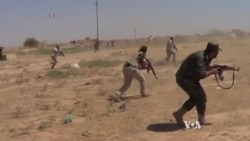Shi'ite militias in Iraq are carrying out abductions, torture and executions against the Sunni civilian population, according to a report from Amnesty International. The attacks are thought to be carried out in revenge for the brutal actions of Sunni Islamic State fighters in northern and central Iraq. Analysts fear a new wave of sectarian violence in the country.
Shi'ite militiamen, from the self-titled Mahdi Army, battled Islamic State fighters last month near the city of Tikrit. The militias have taken a major role, alongside Kurdish forces and the Iraq army, in pushing back the Sunni Islamic State fighters.
But the Amnesty International report accuses the militias of carrying out abductions, executions and torture against the civilian Sunni population in parts of Iraq.
Amnesty International's Senior Crisis Response Adviser Donatella Rovera explains.
“Targeting Sunni men, seemingly in revenge, reprisal for the crimes that have been committed by Islamic State. Basically, treating all Sunnis as somehow supporters of ISIS," said Rovera.
Amnesty says Shi'ite militias have killed dozens of Sunni civilians in the cities of Baghdad, Samarra and Kirkuk. Hundreds of victims were reportedly found handcuffed and shot in the back of the head in execution-style killings.
The militias have become more powerful since the ISIS advance in June, says Rovera.
“The authorities have done absolutely nothing; quite the opposite. Faced with a situation whereby the army simply fled and left abandoned the entire north of the country, if anything the authorities have been encouraging Shi'ite militias to take up arms and fight ISIS," she said.
Iraq’s new Shi'ite Prime Minister, Haider al-Abadi, has pledged to bridge Iraq’s sectarian divisions. Many analysts blame his predecessor, Nouri al-Maliki, for stoking tensions between Shi'ites and Sunnis.
U.N. estimates suggest well more than 1,000 people died through sectarian violence last month.
The brutalities of the Islamic State and reprisal attacks by Shi'ite militias are creating a dangerous situation in Iraq, says Donatella Rovera.
“We are seeing a level of sectarian violence that had not been seen since 2006, 2007," she said.
In those years at the height of the sectarian insurgency, Iraq’s religious clerics ultimately brought the chaos under control, says Afzal Ashraf of the Royal United Services Institute.
“The reason that insurgency was brought under control was primarily because Ayatollah Sistani, the religious head of the Shi'ite community, decided that it was in the Shi'ites' interest, in Iraq’s interest, not to have that insurgency, and to escalate the election process by which they could gain power," said Ashraf.
As their assaults on cities in northern Iraq and Syria continue, analysts say Islamic State fighters remain the biggest threat to the region’s stability. But the building sectarian violence presents a looming threat to Iraq’s future.





